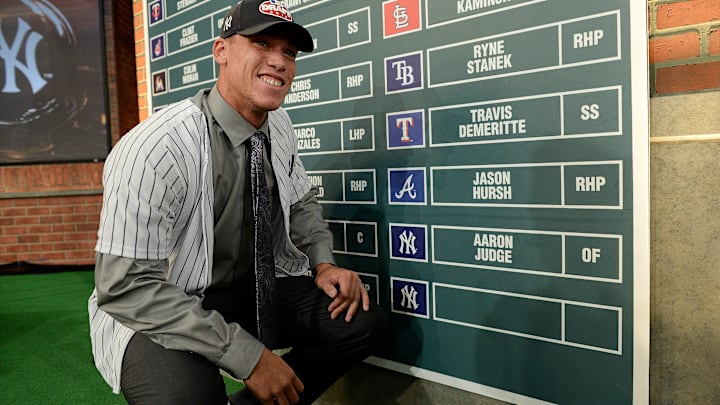As a recent viral chart lays out plainly, the New York Yankees have accrued a shockingly low WAR from their last decade of MLB Draft picks. The Bronx Bombers' 10-year ineptitude streak has provided some decent end-of-year catnip for their many varied haters.
Luckily for the very same Yankees, they happened to draft baseball's best player 11 years ago, one season removed from the dreary decade.
Unfortunately, as this well-laid-out chart lays bare, the Yankees are now one year removed from being able to include the magical evening where they selected Aaron Judge after all 30 teams had passed on him at least once in any decade retrospective.
And, while all the asterisks in the world are necessary to explain why the Astros are top of the league in Drafted fWAR and the Yankees rank 26th with the bozos, it's still an accurate summation of why the rivalry trended in the direction it did from 2017-2023. Yes, the 'Stros finished with the No. 1 overall pick and No. 2 selection in that window, due to orchestrated tanking. Yes, the Yankees had to use several other talent streams to narrow the gap. But this chart includes Alex Bregman, and doesn't include Carlos Correa, George Springer and Jose Altuve.
(Sigh) Advantage: Astros, anyhow.
Yankees jump to 4th on this list if you do last 11 years. Still bad past decade I know. https://t.co/C6VaoFfTIZ
— Steve Angelovich (@AngelSteve89) December 31, 2024
Yankees' past decade of MLB Drafts following Aaron Judge has been bleak
Of course, things don't look quite so bad if you add in the missing fWAR from Judge (51.4), then tack on the hard work of Ian Clarkin and Eric Jagielo for good measure, getting you all the way up to ... 52.2, as neither of those first-rounders ever made the majors. Aroldis Chapman produced a positive WAR in pinstripes, though, no matter how negative it felt at the time.
Bottom line? The Yankees will take Judge. They'll take the pitching development program that has turned late-round picks into viable trade pieces. They'll take Gerrit Cole, the star who chose them. But, if they're going to create something truly sustainable, they'll need players like Anthony Volpe to build on their bursts of success rather than rest on their laurels. And, no matter where they pick, they'll simply have to choose more players who are able to build 10-year track records rather than inflate their value in the minors and fizzle swiftly when pressed.
